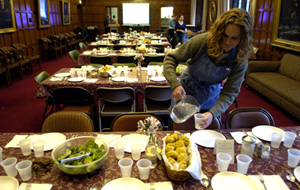|
||
      |
Editor's Notes: Any Wednesday
Shake Day isn’t the quads’ only mid-week bargain. For a three-course meal and food for thought, try lunch at the Divinity School.
Beany Malone would have relished the harvest-and-Halloween menu dished up by the Divinity School Wednesday Lunch cooking crew in late October: pear and goat cheese salad, stuffed squash with hazelnuts and cranberries, and miniature cupcakes topped with bright-orange icing and Halloween candies.

Debra Erickson, a first-year PhD student in religious ethics, readies
a lunch table.
Beany (née Catherine), the youngest of the four motherless Malones of Denver, is the heroine of Lenora Mattingly Weber’s series for teenage girls, and she spends much of the series (the first book appeared in 1943, the last in 1969) worrying about what to cook for dinner and if her family will like it. Beany is also—argued Maureen Corrigan, longtime book critic for NPR’s Fresh Air and author of the new literary memoir Leave Me Alone, I’m Reading—a secular martyr, placed with the nuns’ seal of approval on Corrigan’s grammar-school reading list. Which is why Beany turned up in a discussion titled What Catholic Martyr Stories Taught Me about Getting to Heaven—and Getting Even.
Corrigan’s talk was one of 23 programs scheduled this year in the weekly offering of food and conversation officially known as the Wednesday Community Luncheon. Following on the heels of ecumenical services in Bond Chapel, the Swift Common Room lunches have been going strong for decades. Fare is vegetarian (kosher and vegan options are available by request), and the cost of the meal—starter, entree, and dessert—is $4 (reservations suggested). Student chefs spend Wednesday morning in the room’s vintage pantry; some of their many recipes have been collected in a cookbook, available at the meal “for a donation of $8 to $15.” Funds will go, the cooks say, to “buy equipment that’s younger than we are.”
It’s unlikely that the series will run out of recipes or topics. The week after Corrigan’s appearance, Elizabeth Marquardt, AM’93, dined on soup, salad, and nectarine tart before stepping to the podium to discuss her new book, Between Two Worlds: The Inner Lives of Children of Divorce. First, however, Dean Richard Rosengarten, AM’88, PhD’94, announced that the following Wednesday, U of C sociologist Edward O. Laumann would speak on Sexual Well-being Among Older People. That topic garnered enough laughing comments to make Rosengarten issue a Jon Stewart “settle down” admonishment to the gray-hairs in the crowd.
Back to Beany as martyr
Corrigan, who also teaches literature at Georgetown University, argued that
the “Irish Catholic stoicism” in Beany’s life trajectory—including
the moment when the handsome young man from whom she expects a marriage
proposal announces his decision to become a priest—is fueled by “the
tension between self-fulfillment and offering it up” at the altar
of self-sacrifice.
The Beany books figure in Leave Me Alone, I’m Reading, a project for which Corrigan “decided to give myself permission to just talk about books that had stayed with me.” And, yes, she said during the Q&A, the books’ messages stayed with her, to “mixed” effect: “They toughened me to endure stuff that I would have otherwise more wisely gotten out of much sooner.”